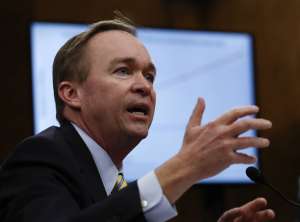

Rep. Mick Mulvaney (R-S.C.) offered his first insights into his management ideas during his two-committee marathon nomination hearings to be the next director of...
The Program Assessment Rating Tool (PART) is coming back. The DATA Act needs more attention and the hiring freeze may end up applying to contractors too.
Those are some of the management high points Rep. Mick Mulvaney (R-S.C.) offered up during his two-committee marathon nomination hearings to be the next director of the Office of Management and Budget. Mulvaney testified before the Senate Budget Committee in the morning and then before the Senate Homeland Security and Governmental Affairs Committee in the afternoon.
“I believe as a matter of principle that the debt is a matter that needs to be addressed sooner rather than later. I also know that fundamental changes are needed in the way we spend and tax if we truly want a healthy economy. This must include changing our long-term fiscal path, which is unsustainable,” Mulvaney said during the Homeland Security and Governmental Affairs Committee portion of his testimony. “Part of fixing our problem also means taking a hard look at government waste and then ending it. American taxpayers deserve a government that is efficient, effective and accountable.”

By bringing back the PART tool, or an updated version of the measurement initiative first used during the President George W. Bush administration, is how Mulvaney said he would help identify waste, fraud and abuse across the agencies.
“We talked about the importance of adding quantitative data to OMB’s analysis. Ending the PART program denied us that management tool. You can’t manage exclusively by quantitative data, but it’s difficult to manage at all with no quantitative data at all,” he said. “Whether or not we reinstitute PART in its old form or do something similar, I am looking forward to adding to OMB’s management tools along the same lines you had as when you were there.”
Sen. Rob Portman (R-Ohio), a former director of OMB under Bush, said he always understood that PART took a lot of time, not everyone loved it, but it helped the White House better understand the effectiveness of programs and whether they needed to add more or less money or just shut the initiative down.
In October, the Heritage Foundation, a conservative think tank, released a blog post calling for a return to PART.
Heritage’s David Muhlhausen connected the need to try a PART 2.0 with the ongoing financial and debt challenges the nation faces. He wrote the best idea to deal with the budget woes is to cut spending.
Mulvaney spent a good portion of both hearings trying to answer questions about his plans for reforming entitlement spending, specifically Social Security, Medicare and Medicaid.
He also defended his support of the 2013 appropriations fight that ended up with the government shutting down.
Mulvaney and several fellow Republicans downplayed the impact of the shutdown.
When asked by Sen. Ron Johnson (R-Wis.), chairman of the Homeland Security and Governmental Affairs Committee, how much of the government actually shut down nearly four years ago, Mulvaney offered this perspective.
“Depends on how you want to measure it. The number that I’ve used is about 15 percent of the government shut down. I think that number has been confirmed if you look at it in terms of the amount of dollars that still flowed out the door,” Mulvaney said.
OMB reported in November 2013 that agencies furloughed 850,000 employees — roughly 40 percent — of the entire workforce. The Obama White House said at the time that federal workers missed 6.6 million days of work and the shutdown cost more than $2.5 billion in lost productivity and pay and benefits for employees, most of which didn’t work.
Several Democratic members wanted assurances from Mulvaney that he understands the broad impact of using shutdown threat as a policy driver.
Sen. Maggie Hassan (D-N.H.), a former governor of her state, said the government shutdown hurt people and the economy.
“I don’t believe that shutdown is a strategy. I don’t believe that shutdown is desirable. What I do believe is that sometimes it is an unfortunate result of us not being able to agree,” Mulvaney said in response. “When people say, ‘You voted for a shutdown,’ That’s not true, there was no such thing as a vote for a shutdown. I voted for an appropriations bill that did not pass. I look forward to being able to encourage the President not to use it as a tool because it’s not an effective tool.”
Hassan said it’s not just an unfortunate tool, but one that impacts and hurts people.
Sen. Claire McCaskill (D-Mo.), the ranking member of the Homeland Security and Governmental Affairs Committee, also pressed Mulvaney on the 2013 shutdown and the federal hiring freeze that President Donald Trump announced Jan. 23.
She asked if Mulvaney understands limiting agencies’ ability to hire full-time workers likely means a growth in contractors, who, she said, tend to cost more than employees. She said during the Bush administration, the Defense Department and the Homeland Security Department saw the number of contractors rise considerably.
At DHS, however, it made sense given the agency was just forming and officials had to get people onboard quickly.
Mulvaney said he wasn’t familiar with the hiring freeze memo, but understands her point about “treating them the same” when it comes to limiting costs.
“Painting with a broad brush may not be the most effective way to deal with the issue. What needs to drive the discussion regarding FTEs versus contractors is the economic consideration,” he said. “I agreed with you that there may be circumstances under which it is more cost-effective and better for the taxpayer to use an FTE versus a contractor and I welcome further discussions about those specific examples.”
Mulvaney said during both hearings that the key to improving spending is through better data.
During questioning before the Senate Budget Committee, Mulvaney said OMB could use the budget function to make sure agencies deal with improper payments, which grew to more than $144 billion in fiscal 2016.
He said there are some agencies who are doing a good job, but others are behind in implementing the Federal Improper Payments Coordination Act, which became law in December 2015.
Mulvaney said he also plans on reinvigorating the federal audit community, particularly agency inspector generals, to help make the government more effective and efficient.
“We are underutilizing a tool. In fact, certain agencies are simply abusing the IG and don’t pay any attention to them at all,” he said. “Generally speaking, the concept of having this person in those agencies who can give us good information. I cannot tell you … most of the data, a lot of times, that we have at the Oversight and Government Reform [Committee] hearings are driven by the IG. Congress needs to have those inspectors general. The President needs to have those inspectors general doing their job and helping us collect information so we can make good decisions about how to fix and reform various institutions. I do look forward to making that a priority at OMB.”
All of these efforts are tied together through the Digital Accountability and Transparency (DATA) Act— a 2014 law requiring agencies to improve how they collect and make spending information accessible. Agencies have until May to get their financial data online in a standardized form, and many are struggling toward that deadline.
“In this age of big data, the government has all of this data but it isn’t capability of using because it can’t even talk to itself about the numbers,” Mulvaney said. “One of the keys is to try to figure out ways to try to fix the system so the data we all have access to is the best possible number, and then be honest about those numbers with the President.”
He said getting better data will improve the way the government functions so decision makers have good information.
The Center for Progressive Reform came out against Mulvaney’s nomination, calling him “an anti-government ideologue.”
“He has repeatedly questioned the reality of climate change and discounts the crucial roles that government research plays in our society. The Director of OMB must be a person who can ensure the smooth operation of agencies that carry out the difficult task of enforcing our bedrock public health and safety laws, not someone who has voted for misguided legislation that would undermine those laws,” said Robert Verchick, president of the Center for Progressive Reform, “As a member of the House’s anti-regulatory, budget-slashing Freedom Caucus, Mulvaney’s past actions presage a dark future at OMB, where he would have the power to slash enforcement budgets at EPA, OSHA, and FDA, imperiling our health and safety.”
Copyright © 2024 Federal News Network. All rights reserved. This website is not intended for users located within the European Economic Area.
Jason Miller is executive editor of Federal News Network and directs news coverage on the people, policy and programs of the federal government.
Follow @jmillerWFED

